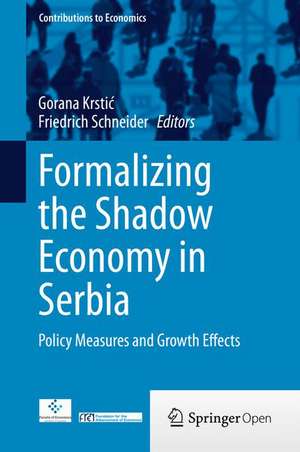Formalizing the Shadow Economy in Serbia: Policy Measures and Growth Effects: Contributions to Economics
Editat de Gorana Krstić, Friedrich Schneideren Limba Engleză Hardback – 5 mai 2015
| Toate formatele și edițiile | Preț | Express |
|---|---|---|
| Paperback (1) | 415.39 lei 6-8 săpt. | |
| Springer International Publishing – 9 oct 2016 | 415.39 lei 6-8 săpt. | |
| Hardback (1) | 422.70 lei 6-8 săpt. | |
| Springer International Publishing – 5 mai 2015 | 422.70 lei 6-8 săpt. |
Din seria Contributions to Economics
- 18%
 Preț: 1001.81 lei
Preț: 1001.81 lei -
 Preț: 90.83 lei
Preț: 90.83 lei - 15%
 Preț: 649.06 lei
Preț: 649.06 lei - 18%
 Preț: 1109.92 lei
Preț: 1109.92 lei - 24%
 Preț: 657.09 lei
Preț: 657.09 lei - 18%
 Preț: 976.54 lei
Preț: 976.54 lei - 17%
 Preț: 361.03 lei
Preț: 361.03 lei - 18%
 Preț: 1027.83 lei
Preț: 1027.83 lei -
 Preț: 283.93 lei
Preț: 283.93 lei - 15%
 Preț: 644.95 lei
Preț: 644.95 lei - 15%
 Preț: 638.24 lei
Preț: 638.24 lei -
 Preț: 394.29 lei
Preț: 394.29 lei - 15%
 Preț: 636.80 lei
Preț: 636.80 lei - 15%
 Preț: 637.78 lei
Preț: 637.78 lei - 18%
 Preț: 723.69 lei
Preț: 723.69 lei - 15%
 Preț: 635.47 lei
Preț: 635.47 lei - 15%
 Preț: 634.00 lei
Preț: 634.00 lei -
 Preț: 392.75 lei
Preț: 392.75 lei -
 Preț: 383.33 lei
Preț: 383.33 lei - 15%
 Preț: 637.28 lei
Preț: 637.28 lei - 15%
 Preț: 636.80 lei
Preț: 636.80 lei - 18%
 Preț: 950.96 lei
Preț: 950.96 lei - 15%
 Preț: 634.68 lei
Preț: 634.68 lei -
 Preț: 387.38 lei
Preț: 387.38 lei - 15%
 Preț: 647.27 lei
Preț: 647.27 lei - 15%
 Preț: 636.63 lei
Preț: 636.63 lei - 15%
 Preț: 639.73 lei
Preț: 639.73 lei -
 Preț: 385.62 lei
Preț: 385.62 lei - 15%
 Preț: 641.85 lei
Preț: 641.85 lei - 20%
 Preț: 649.60 lei
Preț: 649.60 lei - 15%
 Preț: 641.71 lei
Preț: 641.71 lei -
 Preț: 387.96 lei
Preț: 387.96 lei - 15%
 Preț: 645.47 lei
Preț: 645.47 lei -
 Preț: 385.08 lei
Preț: 385.08 lei - 15%
 Preț: 646.62 lei
Preț: 646.62 lei -
 Preț: 383.33 lei
Preț: 383.33 lei - 15%
 Preț: 638.43 lei
Preț: 638.43 lei -
 Preț: 381.21 lei
Preț: 381.21 lei - 15%
 Preț: 642.51 lei
Preț: 642.51 lei - 15%
 Preț: 637.78 lei
Preț: 637.78 lei - 15%
 Preț: 641.71 lei
Preț: 641.71 lei -
 Preț: 384.70 lei
Preț: 384.70 lei -
 Preț: 379.86 lei
Preț: 379.86 lei -
 Preț: 378.34 lei
Preț: 378.34 lei -
 Preț: 384.70 lei
Preț: 384.70 lei -
 Preț: 388.52 lei
Preț: 388.52 lei - 15%
 Preț: 641.71 lei
Preț: 641.71 lei -
 Preț: 381.00 lei
Preț: 381.00 lei - 15%
 Preț: 644.95 lei
Preț: 644.95 lei -
 Preț: 386.00 lei
Preț: 386.00 lei
Preț: 422.70 lei
Nou
Puncte Express: 634
Preț estimativ în valută:
80.91€ • 87.91$ • 68.01£
80.91€ • 87.91$ • 68.01£
Carte tipărită la comandă
Livrare economică 21 aprilie-05 mai
Preluare comenzi: 021 569.72.76
Specificații
ISBN-13: 9783319134369
ISBN-10: 3319134361
Pagini: 179
Ilustrații: IX, 179 p. 71 illus.
Dimensiuni: 155 x 235 x 17 mm
Greutate: 0.45 kg
Ediția:2015
Editura: Springer International Publishing
Colecția Springer
Seria Contributions to Economics
Locul publicării:Cham, Switzerland
ISBN-10: 3319134361
Pagini: 179
Ilustrații: IX, 179 p. 71 illus.
Dimensiuni: 155 x 235 x 17 mm
Greutate: 0.45 kg
Ediția:2015
Editura: Springer International Publishing
Colecția Springer
Seria Contributions to Economics
Locul publicării:Cham, Switzerland
Public țintă
ResearchCuprins
Introduction.- Shadow Economy: Challenges to Economic and Social Policy.- Concept of the Survey of Enterprises and Entrepreneurs Operating Informally.- Causes of the Shadow Economy.- What Is the Extent of the Shadow Economy in Serbia?.- Shadow Economy in the Enterprise and Entrepreneur Sector.- Effects of Formalization of Shadow Economy.- Analysis of the Administrative Capacity of Oversight Bodies.- Main Findings and Recommendations for Formalising the Shadow Economy.
Notă biografică
Gorana Krstić is an Associate Professor at the Faculty of Economics, University of Belgrade. She obtained her PhD in Economics at School of Social Sciences, Sussex University in 2002. Her main research interests are the labour markets, informal economy, poverty and social policy. She has published (and edited) 16 monographs in these fields and has had more than 40 articles published in both national and international journals. She has been consulting short and long term for leading international agencies, including the World Bank, UNDP, ILO, EC and USAID.
Since 1986 Friedrich Schneider has been Professor of Economics at Johannes Kepler University of Linz, Austria. He obtained his PhD in Economics from the University of Konstanz in 1976 and has held numerous visiting and honorary positions at a number of universities. He was the European Editor of Public Choice from 1991 to 2004 and has published extensively in leading economics journals including The Quarterly Journal of Economics, The American Economic Review, The Economic Journal, and Kyklos. He has published (1974 – December 2013) 70 books, 206 articles in scientific journals, and 178 articles in edited volumes.
Since 1986 Friedrich Schneider has been Professor of Economics at Johannes Kepler University of Linz, Austria. He obtained his PhD in Economics from the University of Konstanz in 1976 and has held numerous visiting and honorary positions at a number of universities. He was the European Editor of Public Choice from 1991 to 2004 and has published extensively in leading economics journals including The Quarterly Journal of Economics, The American Economic Review, The Economic Journal, and Kyklos. He has published (1974 – December 2013) 70 books, 206 articles in scientific journals, and 178 articles in edited volumes.
Textul de pe ultima copertă
The main objective of this book is to develop a strategy and policy measures to enhance the formalization of the shadow economy in order to improve the competitiveness of the economy and contribute to economic growth; it explores these issues with special reference to Serbia. The size and development of the shadow economy in Serbia and other Central and Eastern European countries are estimated using two different methods (the MIMIC method and household-tax-compliance method). Micro-estimates are based on a special survey of business entities in Serbia, which for the first time allows us to explore the shadow economy from the perspective of enterprises and entrepreneurs. The authors identify the types of shadow economy at work in business entities, the determinants of shadow economy participation, and the impact of competition from the informal sector on businesses. Readers will learn both about the potential fiscal effects of reducing the shadow economy to the levels observed in more developed countries and the effects that formalization of the shadow economy can have on economic growth.
Caracteristici
Latest theoretical and empirical research on shadow economy in Serbia and other Central and Eastern European countries Investigates thoroughly the consequences of the shadow economy for the official economy Shows policy measures to successfully reduce shadow economy, covering tax policy, regulation, labour market institutions and the financial sector Includes a special survey of registered enterprises and entrepreneurs in Serbia Includes supplementary material: sn.pub/extras

















